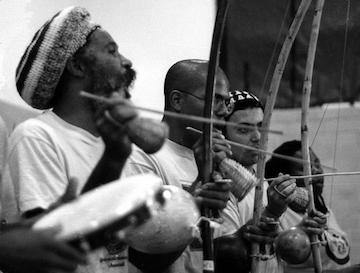Summary | Excerpt | Reviews | Beyond the Book | Read-Alikes | Genres & Themes | Author Bio

Stories
by Jamel BrinkleyThis article relates to A Lucky Man
In "Everything the Mouth Eats," one of the stories in A Lucky Man, the martial art/dance form of capoeira takes center stage.
 Capoeira originated in Brazil possibly among enslaved Africans who were brought to work the land for the Portuguese overlords. The South American country was ruled by the Portuguese from 1500 to 1815 and during this time the slave trade reached Brazil as well. It is said that capoeira originated as a dance form, a means of expression among the slaves who fled to form autonomous colonies in the hinterlands, known as quilombos.
Capoeira originated in Brazil possibly among enslaved Africans who were brought to work the land for the Portuguese overlords. The South American country was ruled by the Portuguese from 1500 to 1815 and during this time the slave trade reached Brazil as well. It is said that capoeira originated as a dance form, a means of expression among the slaves who fled to form autonomous colonies in the hinterlands, known as quilombos.
In the late 17th and early 18th centuries, urban migration brought the art form to major city centers yet for decades capoeira was perceived as an outlawed practice.  Recognition and acceptance as a national tradition would take many more years spurred by the efforts of Manuel dos Reis Machado aka Mestre Bimba who emphasized the martial art aspect of capoeira and won it renewed popularity. This form, known as capoeira regional, is still practiced today along with capoeira angola, which focuses more on the art of history and storytelling through the dance moves.
Recognition and acceptance as a national tradition would take many more years spurred by the efforts of Manuel dos Reis Machado aka Mestre Bimba who emphasized the martial art aspect of capoeira and won it renewed popularity. This form, known as capoeira regional, is still practiced today along with capoeira angola, which focuses more on the art of history and storytelling through the dance moves.
 Capoeira performers dance in a central ring called the roda where the elaborate movements are carried out. Performances are accompanied by music. The accompaniments typically include three berimbaus (a single-chord string instrument originating from Africa), two pandeiros (which is like a tambourine) and one atabaque, a tall wooden drum. The musicians also weave in stories handed down over generations into the performance that is part soulful dance/part martial art. Many believe that modern break dancing has its roots in capoeira.
Capoeira performers dance in a central ring called the roda where the elaborate movements are carried out. Performances are accompanied by music. The accompaniments typically include three berimbaus (a single-chord string instrument originating from Africa), two pandeiros (which is like a tambourine) and one atabaque, a tall wooden drum. The musicians also weave in stories handed down over generations into the performance that is part soulful dance/part martial art. Many believe that modern break dancing has its roots in capoeira.
A clip about capoeira on the Today Show:
Capoeira or the Dance of War by Johann Moritz Rugendas, 1825
Capoeiristas in a roda
A capoeira bateria showing three berimbaus a reco- reco and a pandeiro
Filed under Music and the Arts
![]() This "beyond the book article" relates to A Lucky Man. It originally ran in May 2018 and has been updated for the
June 2019 paperback edition.
Go to magazine.
This "beyond the book article" relates to A Lucky Man. It originally ran in May 2018 and has been updated for the
June 2019 paperback edition.
Go to magazine.
Finishing second in the Olympics gets you silver. Finishing second in politics gets you oblivion.
Click Here to find out who said this, as well as discovering other famous literary quotes!
Your guide toexceptional books
BookBrowse seeks out and recommends the best in contemporary fiction and nonfiction—books that not only engage and entertain but also deepen our understanding of ourselves and the world around us.